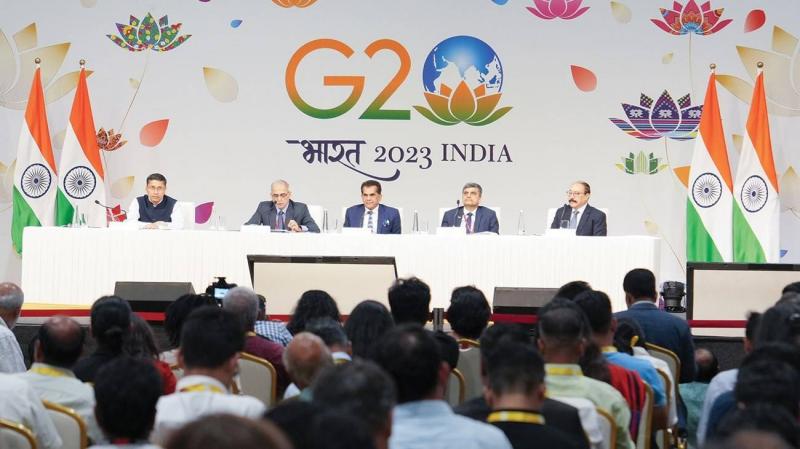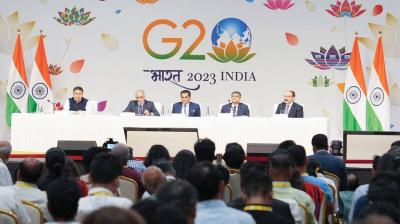Leaders of the 20 strongest nations in the world began their annual summit in New Delhi, India, today, Saturday, by granting the African Union permanent membership, aiming to increase the representation of the group. However, the group continues to face significant divisions regarding the war in Ukraine, as Western countries seek a strong condemnation of Russia, while other countries urge a focus on economic issues. U.S. President Joe Biden and other leaders of the G20 will meet during the two-day summit at a new conference center that cost $300 million, named Bharat Mandapam, located opposite a 16th-century stone fort.
Businesses, shops, offices, and schools in the city of Delhi, which has a population of 20 million, were closed, and traffic was restricted as part of security measures to facilitate the movements for this high-level meeting hosted by the country. Slums were demolished, and streets were cleared of monkeys and stray dogs. The draft, consisting of 38 pages circulated among members, left the section on "geopolitical situation" blank, with an agreement reached on the remaining 75 sections.
A White House official stated that Biden will advocate for stronger climate efforts from major countries during the summit, amid growing concerns about the lack of consensus on reducing emissions. A source informed Reuters today that the delegations participating in the summit reached an agreement on the wording used to refer to the Russian invasion of Ukraine. The source added that the delegations are still discussing whether to issue a joint statement from the leaders or a statement at the end of the summit. Representing Russia at the meeting is Foreign Minister Sergei Lavrov, who said he would obstruct the issuance of the final declaration unless it reflects Moscow's stance on Ukraine and other crises.
In his opening remarks at the summit, Indian Prime Minister Narendra Modi invited the African Union, represented by its president, Azali Assoumani, to sit at the table of G20 leaders as a permanent member. The summit is expected to be dominated by the West given the absence of Chinese President Xi Jinping, who sent Prime Minister Li Qiang to represent China, and the absence of Russian President Vladimir Putin.
Among the leaders participating in the summit are U.S. President Biden, German Chancellor Olaf Scholz, French President Emmanuel Macron, British Prime Minister Rishi Sunak, Saudi Crown Prince Mohammed bin Salman, Japanese Prime Minister Fumio Kishida, and others. A source informed Reuters that the joint declaration may be issued by consensus or without it. It may include various paragraphs reflecting the views of different countries or capture agreements and disagreements in one paragraph.
Another source indicated: "We may move beyond the disagreements to issue a comprehensive statement urging peace and harmony worldwide so that everyone agrees." Sources indicated that Turkish President Erdogan held talks with Japanese Prime Minister Kishida regarding reviving the grain export agreement across the Black Sea. According to another high-ranking source from one of the G20 nations, Western countries agreed on the paragraph regarding the war in Ukraine and sent it to Russia to ascertain its views.
The official stated that Russia is free to accept the views of Western nations and express its opposition as part of the statement. If no agreement is reached, India will need to issue a summit presidency statement, which means the G20 will not issue a declaration for the first time in 20 years of summit meetings. An EU diplomat clarified that Russia is "obstructing the consensus acceptable to everyone else." Disagreements regarding the war hindered the ability to reach an agreement on a statement during ministerial meetings under India’s presidency of the G20 this year.
Modi substitutes "India" with "Bharat"
A sign placed in front of Indian Prime Minister Narendra Modi at the opening of the G20 summit today referred to his country as "Bharat," raising speculations about a potential change in the country's name. Modi, speaking in Hindi, stated, "Bharat welcomes the representatives as G20 president." India is also referred to as "Bharat," "Bharata," and "Hindustan" in Indian languages, names dating back to pre-colonial times, and they are used interchangeably by the people and officially.
A draft reviewed by Reuters for the declaration to be issued by the G20 summit stated that the African Union will become a permanent member of the group during the summit in New Delhi. The African Union, which includes 55 member states, will gain the same status as the European Union, the only regional bloc with full membership in the G20. The EU's current status is as an "invited international organization." The draft declaration states, "We welcome the African Union as a permanent member of the G20 and believe that the inclusion of the African Union in the group will significantly contribute to addressing global challenges in our age."
India's delegate at the summit, Amitabh Kant, revealed that the new New Delhi declaration is in its final stages and will be recommended to the leaders of the G20 nations during the two-day summit beginning today. This statement came during a preliminary press conference for the G20 summit, attended by the Emirati news agency WAM, at the Bharat Mandapam International Exhibition and Convention Center, which will host the summit activities.
Kant stated that India has held over 220 meetings related to the G20 in 60 cities across India, showcasing India's diversity and distinct structure. He added, "India is preparing to move forward towards the finish line during the summit that begins today to discuss addressing some global economic challenges." Kant emphasized the importance of achieving sustainable and inclusive growth, especially as a third of the world faces economic challenges, highlighting the significance of technological development and addressing the climate crisis. He affirmed the need to support funding for environmental and climate actions, particularly in developing countries, calling for reforms in multilateral development banks. He also stressed the importance of developing technology and digital infrastructure as part of India’s vision during its presidency of the G20.




